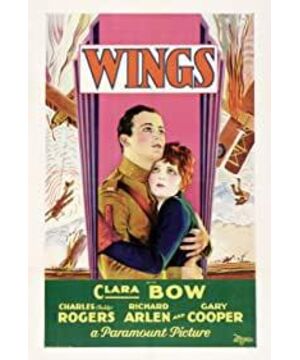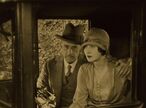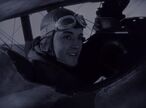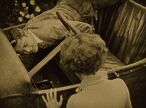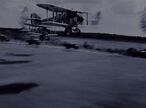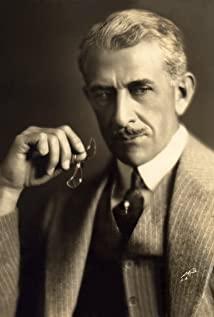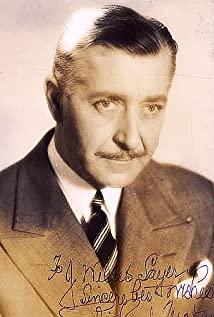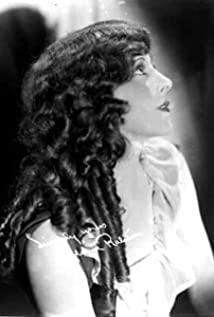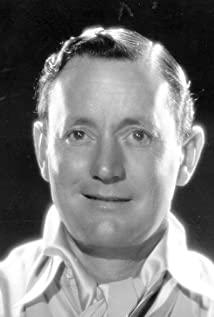When I first saw the best film of the first Academy Awards, I didn't know the production team. I was only touched by its "love". Recently, I took out the restored version and watched it again, and I also got a little understanding behind the scenes. This is the first air combat film by John Monk Saunders, an authoritative playwright in the field of air combat in World War I. It was also initiated by him, led, and won support from the US military to establish the project. It can be said that there would be no Wings without him. During the first screening of Wings, it coincided with the young Lin Bai flying the Spirit of Saint-Louis to complete the feat of a single-wing, single-engine, non-landing transatlantic flight, sweeping the aviation boom across the world. The success of Wings is inseparable from the success of Lin Bai. It complemented each other, and at the same time drove the craze of a series of air combat movies in the 20s and 30s, such as Howard Hawks' The Dawn Patrol, Howard Hughes' Hell's Angels. Really making large-scale air combat movies was a money-burning move both at the time and now. As a result, Wings’ production costs reached US$2 million, and Hell’s Angels, which was released three years later, reached US$4 million, which was an amazingly huge sum of money in the 1920s.
What's interesting is that Wings is also a classic collaboration of two U.S. Army aviation battlefield non-staff: John Monk Saunders, who wrote the script, and director William Wellman. "Supernumerary" is my ridiculous statement, which means that the two U.S. Army aviation pilots failed to enter the First World War battlefield as U.S. Army aviation pilots to participate in the air combat. Wellman is indeed a veteran of the First World War, but during the war, he served in the French Foreign Corps and was sent to the Lafayette Flying Team as a fighter pilot. He drove in Newport. He was decommissioned and returned to the United States after the crash. He joined the United States at the end of the war. The Army Aviation (USAAS), because it was the end of the war and did not get the opportunity to return to the French battlefield, stayed in the country as an air combat tactical instructor, so his experience in World War I air combat was in the French army, not in the US army. As for JMS, when the armistice agreement was signed in November 1918, he was serving as a flight instructor in Florida to train pilots for air combat. On that historic night, he walked out to the airport alone, with his head leaning on the wing of his plane, shed down. After tears, he felt sad that the declaration of a truce meant the end of the war, and he never had the opportunity to share the common experience with the great generation as a possible aerial combat ace.
The script written by JMS, from Wings in 27 to The Dawn Patrol in 30 to The Last Flight in 31 to The Eagle and the Hawk in 33, the mind is gradually changing. The tone is getting desperate. There is also a reluctant ending of the reunion of the male and female heroes in Wings. Although it is not complete, it can be called bright. It reveals the positive and optimistic "to continue to build life after destruction". The end of TDP is an endless loop of despair. Flight spied on PTSD and Eagle. The protagonist simply has a mental breakdown and commits suicide. Reminiscent that JMS himself was only in his prime (42 years old) when he hanged himself in 1940. The despair in this drama and the self-destruction and self-determination in real life have somewhat formed an intertextuality. JMS is a contradictory person. Although his main dramas are all undisputed anti-war themes (which may be a kind of speculation, it caters to and feeds back the disillusioned public sentiment after the war), but he himself did not have the opportunity to participate in the front line. Air combat regrets for life. During the war, he failed to become the great generation worthy of the name, but after the war he became the lost generation worthy of the name. Self-determination is trapped in poor health, and poor health is rooted in his self-destructive tendency and nihilism. This is the so-called " The common problem of "Lost Generation" is like Fitzgerald, seeking how to die fast. He did not actually participate in the air combat of World War I, but used his entire career as a writer for the theme of air combat in World War I. I don’t know if this is regarded as a compensation. How deep this regret will be to reverberate endlessly in his post-war period. Life, and ultimately dominate his life.
It is said that before the war Wellman met Douglas Fairbanks Sr., the tipping father, and because he had a good appearance, Old Fei suggested that he be an actor. After the war, Wellman accepted the suggestion and was introduced by Fei to a certain movie. There is a role in the movie, but due to an accident, Wellman loses interest in being an actor and hates the prospect of being an actor, so he concentrates on becoming a famous director behind the scenes.
The lineup of Wings is very young: director Wellman, born in 1896, script writer JMS, in 1897, Charles Buddy Rogers who played John Powell, 1904, Richard Arlen who played David Armstrong, in 1899, the director was the oldest by all accounts. That one is only 30 years old, and producer Lucien Hubbard is under 40 years old.
In shooting air combat footage, the army pilots did a lot of stunt work. Wings invented a fixed position in front of the fuselage and an electric camera. Because the two planes in flight cannot be too close during real shooting, and there are problems such as shaking, the photographer cannot sit on another plane and shoot the actors flying. For close-up shots, the electric camera can only be installed in the front part of the aircraft piloted by the actor, and the various actions and facial expressions of the actor can be recorded during the flight. Because it is a close-up shot, it is not possible to use a stunt pilot as a stand-in, only the actors themselves. One of the two leading actors, Richard Arlen, himself had flight experience before. Wings’s documentary said that he had been a flier with RFC in Canada. The trouble is that Buddy Rogers, who plays Jack, has no flight experience and has to learn now, so he is quite It's not easy. After all, flying a plane is still risky. About the same time, Howard Hughes took pictures of Hell's Angels. Three pilots died in an accident. In the book The Man and His Wings: William A. Wellman and the Making of the First Best Picture, written by Wellman’s son, Wellman Jr. confirmed that both Arlen and Buddy were flying their own planes to take aerial shots, even though Buddy hated flying. He vomited every time he landed, but he still flew in the sky for 98 hours, winning the respect of the director. Three years later, Wellman directed an air combat movie Young Eagles (1930), in which Buddy, who led the lead, rode the plane and shot it himself again. Although Young Eagles has not been as successful and classic as Wings, and the director himself does not like it, there are still dogfight shots worth seeing. For lovers of World War I air combat, there is better than nothing.
Unlike The Dawn Patrol in 30/38, which focused on British pilots in RFC, and The Eagle and the Hawk in 33 years, which focused on American foreign aid in RFC, Wings wrote about AEF's own Air Service pilots. Because I spent a considerable amount of time in the pre-war small town life, military enlistment, and domestic training phases, and after the opening of France, there were two major periods of Paris vacation and ground offensive. The time allocated to pilots was relatively limited, and basically concentrated on air combat and the two protagonists. No, we can't see the organization building. The movie only tells us that Jack and Dave are in the 39th Squadron, but we can't even see the 39th Squadron's mess, and we won't know the other pilots and comrades of the two protagonists. In the domestic training phase, at least Gary Cooper played a soy sauce, playing the role of a pilot named White, and crashed when he appeared on the scene. It depends on the organization of the squadron or The Dawn Patrol. The main storyline of Wings is very simple. The story of two young Americans who went to the front line. The expression of emotions by people in the 1920s was simple and natural. With its simplicity, naturalness and sincerity, it looks lovely today, without any pretentious feeling. . For individuals, the two saddest scenes were Dave and Jack's death, and Jack returned to China to meet Dave's parents after the war. Jack became a war hero warmly welcomed by the people. Dave had only his parents who lost his only child to mourn for him. The French said C'est la guerre, and Dave's mother said It's war. It’s sad for a good friend to die and kiss on his deathbed. What’s more sad is that when Jack chased Dave, no matter how Dave went around in circles trying to remind him that he was not an enemy plane, he would ignore it, and Dave would do it every time before taking off. The phrase "All set?" that I asked, and the phrase "All set?" at the end with a gesture before death (it can be compared to the "Happy landings." in The Dawn Patrol. The details of these scripts are really deep in my heart, a line When I read it, I would even ignore it. I didn’t understand it until I finished reading the whole article. I was stunned, and when I thought about it afterwards, I would be tortured to death. The infinite affection and friendship are all in a bland sentence, worth a thousand words.)
The Red Baron appeared in the film as a benchmark character under the pseudonym of "Captain Otto Kellermann" and showed a knightly style. After Dave's machine gun jammed, he let Dave go directly and flew away after a military salute. There was no danger. It was a sportsmanlike. . Xiaohong is also known as the super ace Von Richter in The Dawn Patrol, but his real name is only in Hell's Angels ==
As a groundbreaking air combat movie, any further request for Wings is frantic.
View more about Wings reviews


